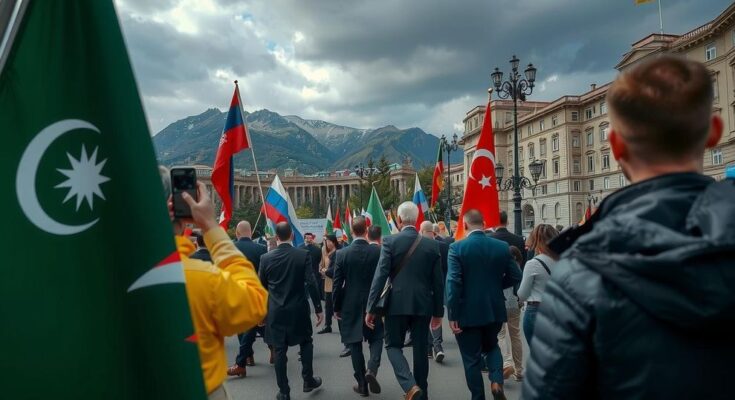Most opposition parties in Canada are boycotting the UN climate change conference in Azerbaijan due to the country’s human rights issues, particularly following the ethnic cleansing of Armenians from Nagorno-Karabakh. Green MP Mike Morrice criticized the UN’s choice of host due to Azerbaijan’s role as an oil producer and ongoing human rights concerns, echoing sentiments shared by the NDP and Bloc Québécois. Environment Minister Steven Guilbeault’s potential attendance remains uncertain amidst these criticisms, raising questions about the appropriateness of hosting climate discussions in countries with poor human rights records.
Numerous opposition parties in Canada have announced their decision to abstain from attending the upcoming United Nations climate change conference in Azerbaijan, attributing their withdrawal to significant human rights issues related to the host country. The event follows the expulsion of around 120,000 ethnic Armenians from Nagorno-Karabakh, exacerbating concerns about Azerbaijan’s suitability as a host. Green Party MP Mike Morrice remarked on the troubling implications of selecting Azerbaijan, particularly given its status as a major oil producer amid ongoing allegations of ethnic cleansing. The Armenian National Committee of Canada has called for Canadian elected officials to refrain from attendance, advocating that only public servants participate instead. Both the New Democratic Party (NDP) and the Bloc Québécois echoed similar sentiments by confirming their absence from the event, citing severe human rights concerns in Azerbaijan. Bloc climate change critic Kristina Michaud particularly emphasized her discomfort in attending due to her stance as an ally of Armenia and pointed out the contradictory nature of hosting climate conferences in oil-rich nations. Despite these criticisms, Canadian Environment Minister Steven Guilbeault indicated that he might still participate, although his office has not confirmed attendance. Guilbeault previously raised concerns over Azerbaijan’s fossil fuel policies, stating the importance of focusing international efforts on climate change rather than the interests of autocratic regimes. Meanwhile, the Canadian government has faced scrutiny over its relationship with Azerbaijan, particularly following reported human rights abuses and the plight of displaced Armenians. Furthermore, the Armenian government has surprisingly supported Azerbaijan’s position as the COP29 host, reflecting the complex dynamic between the two nations in their slow peace process. The situation underscores a broader discussion on the intersection of climate action and human rights, calling into question the appropriateness of certain countries hosting global events intended to promote international cooperation on climate change.
The article sheds light on the decision of several Canadian opposition parties to boycott the UN climate change conference in Azerbaijan, driven by serious human rights concerns tied to recent events affecting ethnic Armenians in Nagorno-Karabakh. This context highlights the ongoing tension between Azerbaijan and Armenia, building upon a history marked by conflict and allegations of ethnic cleansing. The criticism directed towards Azerbaijan revolves around its role as a fossil fuel producer and its controversial human rights record, rendering its selection as a host for environmental discussions contentious.
In summary, the decision of Canadian opposition parties to abstain from the UN climate change conference hosted in Azerbaijan reflects broader societal concerns regarding human rights violations amidst ongoing political conflicts. The interplay between climate change diplomacy and human rights advocacy has prompted significant discourse among Canadian political figures, revealing the complexities involved in choosing host nations for global events. Continued scrutiny of Azerbaijan’s policies may shape future responses from international communities regarding such critical discussions.
Original Source: www.cbc.ca




